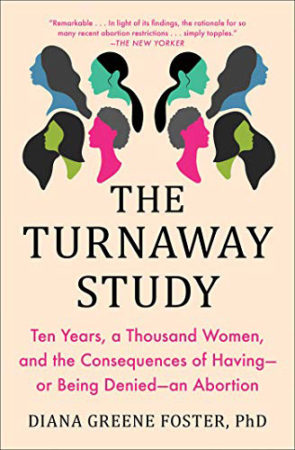The Turnaway Study: Ten Years, A Thousand Women, and the Consequences of Having — or Being Denied —
An Abortion
Diana Greene Foster (Scribner, $36, 360 pages)
 Make no mistake that the landmark “Turnaway Study” — a data-driven examination of what happens to women who cannot get abortions — comes from an explicitly pro-abortion point of view. The comparative study of women who received and those who were denied abortions (usually due to the gestational age of their preborn child) examines a wide variety of factors relating to mental and physical health, careers, and their relationships with intimate partners and other children. The study was conducted by the Advancing New Standards in Reproductive Health (ANSIRH), an abortion advocacy group, and too many media outlets treat their research as unbiased scholarship. Dr. David Reardon of the Elliot Institute had a thorough and excellent critique of their methodology in the Linacre Quarterly (August 2018) which concludes that the “Widely publicized claims regarding the benefits of abortion have been discredited.” The headline finding of the “Turnaway Study” is that 95 per cent of women do not regret their abortion or suffer from any mental health effects. But the ANSIRH study admits that nearly 70 per cent of women it sought to interview about their abortions refused to respond, and another half of those that did agree to be interviewed dropped out before the study was complete. Might those who did not want to talk about their abortions perhaps have significantly changed the results of the study? It makes sense that they would.
Make no mistake that the landmark “Turnaway Study” — a data-driven examination of what happens to women who cannot get abortions — comes from an explicitly pro-abortion point of view. The comparative study of women who received and those who were denied abortions (usually due to the gestational age of their preborn child) examines a wide variety of factors relating to mental and physical health, careers, and their relationships with intimate partners and other children. The study was conducted by the Advancing New Standards in Reproductive Health (ANSIRH), an abortion advocacy group, and too many media outlets treat their research as unbiased scholarship. Dr. David Reardon of the Elliot Institute had a thorough and excellent critique of their methodology in the Linacre Quarterly (August 2018) which concludes that the “Widely publicized claims regarding the benefits of abortion have been discredited.” The headline finding of the “Turnaway Study” is that 95 per cent of women do not regret their abortion or suffer from any mental health effects. But the ANSIRH study admits that nearly 70 per cent of women it sought to interview about their abortions refused to respond, and another half of those that did agree to be interviewed dropped out before the study was complete. Might those who did not want to talk about their abortions perhaps have significantly changed the results of the study? It makes sense that they would.
Despite its shortcomings, there are important lessons to be gleaned from the study’s findings. In the section on mental health, Foster reports, “One week after abortion denial, 65 per cent of participants reported still wishing they could have had the abortions; after the birth of the child, only 12 per cent reported they still wished that they could have had the abortion.” By the time the child reached his or her first birthday that number falls to seven per cent and by the fifth birthday, it is down to four per cent. This suggests that one third of women denied an abortion either changed their mind or came to accept not having an abortion relatively quickly (one week), a powerful argument for a waiting period between requesting an abortion and carrying it out. It also shows that most women who have children after being denied an abortion, make peace with the child they kept so being denied an abortion is hardly the trauma abortion advocates claim it is. Interestingly, women whose children were given for adoption regretted not getting an abortion at a slightly higher rate (15 per cent wish they still had an abortion five years after the child’s birth). These findings might inform pro-life strategies about the efficacy of waiting periods and wisdom of promoting adoption.




